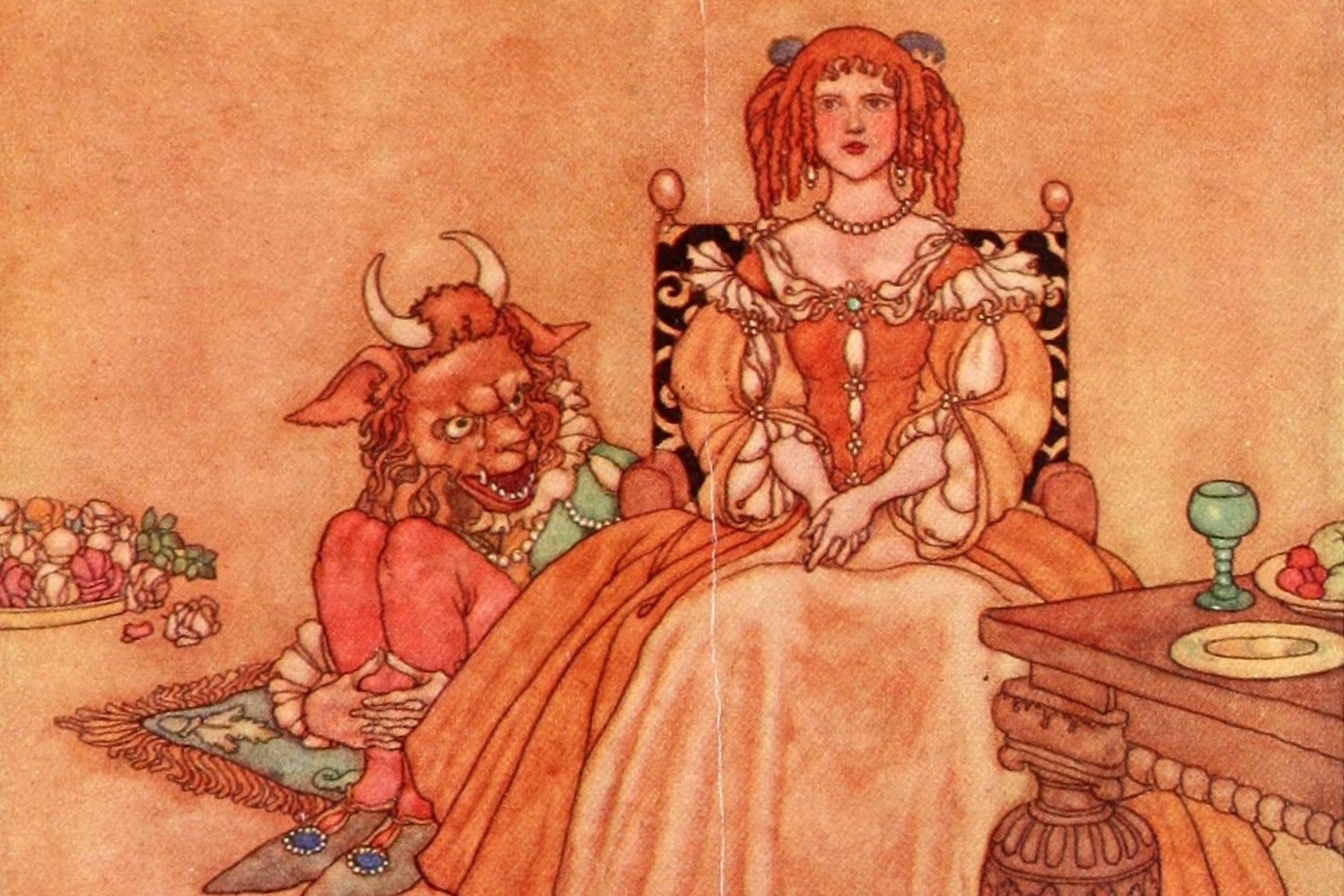“Beauty and the Beast” offers a more complex take on romance than many fairy tales: the characters have a chance to get to know each other and gradually fall in love, rather than your standard love at first sight or love at first (questionably consensual) kiss story. As noted in our previous discussion, there’s a lot of love for this particular tale, and many retellings, adaptations, and updates are straightforward and sweet. But there are also plenty of authors willing to dig into the complexities and weirdness underlying an older story and find something new. And there is some serious weirdness to dig into, here, so let’s bring out the shovels! If you think about it, the background of the original story, including the whole arrangement between Beauty’s father and the Beast, doesn’t really mesh comfortably with modern sensibilities, does it?
Consider: The merchant is willing to sacrifice his youngest daughter to a monster on his own behalf, and she more or less willingly she accepts the deal and goes to save her father’s life, which is a sticky moral quandary at best. Beauty is either not allowed to leave, or doesn’t know that she can leave. The Beast continues to pressure her to marry him throughout their acquaintance/co-residency, in spite of her repeated refusals. She returns to the palace because it’s the only way to, again, save a man’s life—this time the Beast’s, by declaring her willingness to marry. Finally, he is transformed back into a handsome prince, his curse broken by Beauty’s compliance to a set of rules she’s never been informed of or been allowed to understand.
Pretty messed up, right? Right off the bat we’ve got a father trading his daughter’s life for his own, a fairy tale version of Stockholm syndrome, and some pretty manipulative emotional blackmail. When you look at it that way, it’s not at all surprising that some retellings approached the story from a less romantic angle, questioning the more bizarre, bothersome, or just plain beastly aspects of these characters’ lives and some of the assumptions that underlie their “happy ending.”
“The Beast” by Tanith Lee, from Ruby Slippers, Golden Tears, edited by Ellen Datlow and Terri Windling
Lee turns the story inside out in this retelling that skirts the lines between “Beauty and the Beast” and another tale that starts similarly but ends quite differently—“Bluebeard.” Isobel’s father arranges for her to meet Vessavion, a rich lord known for his eccentric collection of beautiful things. The two fall for each other, and Isobel’s father dies shortly thereafter, satisfied that he’s been able to secure his daughter’s future. Vessavion swears that he can’t live without Isobel, but after they have an odd little conversation about beauty, Isobel is gripped by a dark suspicion and searches their home until she finds her husband’s ugly secret.
Beastly by Alex Flinn
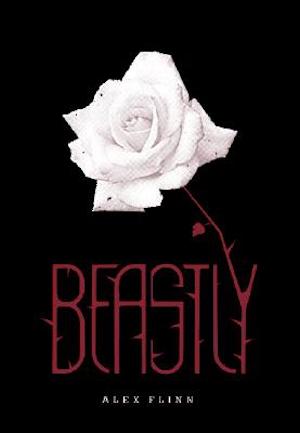
This YA title had a moment in the spotlight when it was made into a movie in 2011, but the movie was not well received by critics and faded into obscurity. I may be showing my hand as a librarian-at-heart but I’ll say it: The Book Is Better. (Though I had forgotten until I looked it up again that Neil Patrick Harris is in the movie, so enjoy that if you do watch it.) Set in modern day (well, 2009) New York City, Kyle Kingsbury has it all: looks, money, friends, and a penchant for breaking young women’s hearts just because he can. But his classmate Kendra curses him, taking away his good looks and giving him just two years to prove he can make a genuine connection with another person. When Lindy stumbles into his life, he has just once change to prove that he may be beastly, but he’s not a monster.
“The Merry Spinster” from The Merry Spinster by Daniel M. Lavery
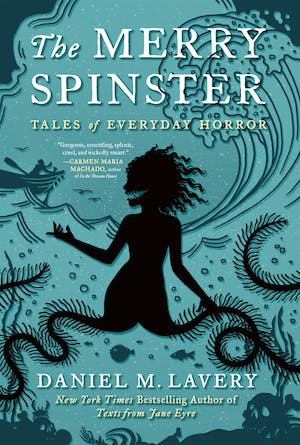
Throwing a dash of modernity into this tale as old as time, Beauty’s mother is a rich executive who makes some unfortunate business decisions and loses most of her assets. When she heads to the city to check on a few investments that might make the family more comfortable, she becomes lost while driving in a rainstorm and finds her way to a great house, only to overstep the hospitality by snagging a branch from a rose bush. The beast confronts her and requires her to send a daughter in her place, and Beauty agrees to go. Once she gets to the house, the real horror begins, as Lavery traces uncomfortable lines between agreement and coercion, generosity and ownership, grief and manipulation.
“The Tale of the Rose” from Kissing the Witch by Emma Donoghue
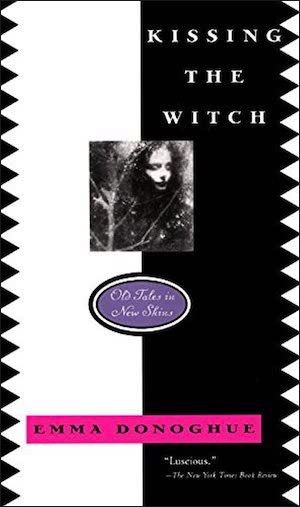
Part of Donoghue’s stellar collection of linked tales, this retelling of “Beauty and the Beast” starts out on familiar ground, with Beauty promised to a terrifying beast in exchange for a newly opened red rosebud. Beauty remains frightened of the beast but has everything she could wish for. Eventually, when she learns that her father has fallen ill, she goes to nurse him back to health. Upon returning home, she finds that she sees her family from a new perspective, seeing the toxicity of her shallow sisters and her father’s helpless mildness, and realizes she doesn’t want to stay here, either. But Beauty’s return to the ailing beast reveals not a prince, but a queen who decided not to rule over people who didn’t truly need her or understand her. When they stay together, legend grows of the castle where the Beauty lives with her beast—or is it two beauties, or perhaps two beasts?
“Ugly and the Beast” from Feminist Fairy Tales by Barbara G. Walker
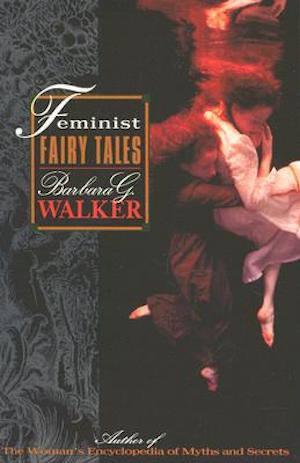
The eldest sister in this merchant’s family is homely but beloved by her siblings, who recognize her virtues of kindness, cheerfulness, and compassion. When their father has his encounter with the Beast and his palace, and takes a golden rose statue uninvited, it is of course this eldest sibling, known affectionately as Ugly, who takes her father’s place in the Beast’s home. Ugly and the Beast soon come to enjoy each other’s pleasant company, and the Beast admits that he had a Beauty once—since she longed for a handsome prince, he had created an illusion of himself as her prince. But it was exhausting to maintain so he eventually admitted to the deception, and she left him. Ugly and the Beast love each other just as they are, and perhaps are better off for it.
What do you think? Are there other interesting twists and reimaginings of the original story that you’d recommend? And are there aspects of “Beauty and the Beast” that seem especially weird or troubling, when you start to dig a little deeper? Sound off in the comments!
